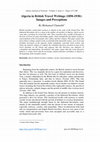Papers by Mohamed Chamekh
French cultural studies, Apr 1, 2024
HAL (Le Centre pour la Communication Scientifique Directe), Jan 14, 2021
HAL (Le Centre pour la Communication Scientifique Directe), Feb 11, 2016

This book addresses the British broadcast media’s coverage of the conflict in Northern Ireland th... more This book addresses the British broadcast media’s coverage of the conflict in Northern Ireland throughout the 1980s, one of the most turbulent decades in post-war British and Irish history. It explores the incessant wrangling between the government of Margaret Thatcher and an aggressive broadcast media determined to provide objective news and information about the complexities of ‘the Troubles’ to regional, national, and international audiences. The Thatcher government was determined to protect its interests by shaping a narrative of the conflict in simplistic terms, presenting it as a fight between the democratic forces of law and order and ruthless terrorists hell-bent on carnage and chaos. Programming that questioned this simple paradigm by challenging the decisions, policies, and tactics of politicians, civil servants, and the army provoked outrage, angering governments intent on influencing how the conflict was presented at home and abroad. Senior officials employed a variety o...

Cette thèse porte sur l’étude de la station balnéaire de Skegness et les vacances de la classe ou... more Cette thèse porte sur l’étude de la station balnéaire de Skegness et les vacances de la classe ouvrière en Grande Bretagne. Elle valide le déclin des stations balnéaires britanniques en tenant compte des expériences plurielles et des stratégies de régénération et de survie du tourisme balnéaire. Les deux premières parties de la thèse ont analysé le développement des vacances balnéaires, comme une alternative aux anciens loisirs, et démontré l’apparition de Skegness en tant que station balnéaire suite au changement des conditions socioéconomiques des ouvriers. Cette thèse a également détaillé comment Skegness a été promue comme une station balnéaire à l’époque en se focalisant sur le rôle joué par les compagnies ferroviaires dans la promotion de la station par le biais d’affiches et de publicité dans les journaux. L'étude du matériel promotionnel a démontré les changements dans l'image de la station balnéaire et le ton social annoncé dès les premières années de l'aménagem...
Popular Music and Society, 2021

Cette these porte sur l’etude de la station balneaire de Skegness et les vacances de la classe ou... more Cette these porte sur l’etude de la station balneaire de Skegness et les vacances de la classe ouvriere en Grande Bretagne. Elle valide le declin des stations balneaires britanniques en tenant compte des experiences plurielles et des strategies de regeneration et de survie du tourisme balneaire. Les deux premieres parties de la these ont analyse le developpement des vacances balneaires, comme une alternative aux anciens loisirs, et demontre l’apparition de Skegness en tant que station balneaire suite au changement des conditions socioeconomiques des ouvriers. Cette these a egalement detaille comment Skegness a ete promue comme une station balneaire a l’epoque en se focalisant sur le role joue par les compagnies ferroviaires dans la promotion de la station par le biais d’affiches et de publicite dans les journaux. L'etude du materiel promotionnel a demontre les changements dans l'image de la station balneaire et le ton social annonce des les premieres annees de l'amenagem...

Review of African Political Economy, 2021
In light of the discrepancy between Britain's and France's postcolonial security roles in... more In light of the discrepancy between Britain's and France's postcolonial security roles in Africa, which seemed already determined half a decade after independence, this book studies the making of the postcolonial security relationship during the transfer of power and the early years of independence (1958-1966). It focuses on West Africa, and more specifically the newly independent states of Nigeria and Cote d'Ivoire, which rapidly evolved into key players in the postcolonial struggle for Africa. Based on research in fourteen archives in Africa, Europe, and the United States, Postcolonial Security comparatively investigates the establishment of formal defence relations, the disintegration of the Anglo-Nigerian 'special relationship' and the Franco-Ivorian 'neo-colonial collusion', the provision of British and French military assistance to their former colonies and the competition they faced from West Germany and Israel respectively, and the Anglo-American partnership in Nigeria and the Franco-American rivalry in Cote d'Ivoire. It demonstrates that whereas Britain was rapidly and increasingly pushed out of and replaced in the Nigerian security sector by western competitors, France succeeded in retaining its military foothold and pre-eminence in Cote d'Ivoire. Informed by postcolonial approaches, Postcolonial Security argues that while London's Cold War blinkers and Paris's neo-imperial agenda were part of the equation, the postcolonial security relationship was ultimately determined by the Nigerian and Ivorian elites, which in turn responded to their local and regional circumstances against the background of the Cold War in Africa.
Ethnomusicology Forum, 2021
Great Britain has experienced in the opening decades of the 21st century the continuation of deba... more Great Britain has experienced in the opening decades of the 21st century the continuation of debates on issues related to identity, multiculturalism, immigration, racial profiling, and nationalism....
British Journal of Middle Eastern Studies, 2021
Middle East Critique, 2020
Abstract Awled AL Manajim musical group was forced to go underground under Ben Ali (1987-2010) as... more Abstract Awled AL Manajim musical group was forced to go underground under Ben Ali (1987-2010) as the consequence of regime censorship and restrictions on engaged artists. The post-Ben Ali era experienced the proliferation of other types of underground music, in particular rap and hip-hop which achieved major importance in comparison with the old forms of the underground that managed not only to survive Ben Ali’s dictatorship, but also created a culture of resistance through art. This article argues that Awled AL Manajim contributed to the development of a resistance movement in the Mining Basin and suggests that this musical group managed, to a certain extent, to articulate the causes and concerns of the local populace.
ATHENS JOURNAL OF MEDITERRANEAN STUDIES, 2020
This article explores illegal migration through Tunisian rap. It considers this music an aspect o... more This article explores illegal migration through Tunisian rap. It considers this music an aspect of resistance and protest against the socio-economic and political conditions obliging thousands of Tunisians to cross the Mediterranean in makeshift boats in search of better prospects and challenging the increasing security and legislative measures crippling mobility imposed by the EU and Tunisian authorities. This article contends that harga songs document the history of the working class in Tunisia and carve the identity of harraga as people who have been marginalised for generations. It concludes that EU-Tunisia security talks and dialogues remain ineffective as long as the root causes of illegal migration have not been addressed. Keywords: illegal migration, Tunisian rap, resistance, marginalization, security, immobility, identity
Middle East Critique, 2021
Abstract: This article explores a unique type of songs performed by a Black minority musical grou... more Abstract: This article explores a unique type of songs performed by a Black minority musical group in southeastern Tunisia. Taifa, a group of Black singers, mainly from the rural working class appeared as a response to the economic marginalization of Blacks after the abolition of slavery in Tunisia in 1846. It explores the way this musical group developed and how it came to be associated with the norms of respectability among the local society. It also delves into the themes of Taifa songs that, I contend, show an incremental journey of integration into the predominant Arab/Berber majority and an adjustment to Tunisia’s social and political changes, which were reflected in the changes in the themes of Taifa songs after the Tunisian Revolution.

During the 1920s and 1930s radio was transnational in its reach and appeal, attracting distant li... more During the 1920s and 1930s radio was transnational in its reach and appeal, attracting distant listeners and encouraging hopes that broadcasting would foster international understanding and world peace. As a new medium, radio broadcasting transmitted speech, music, news, and a range of exotic and authentic sounds across borders to reach audiences in other countries. In Europe radio was regulated through international consultation and cooperation to restrict interference between stations and to unleash the medium’s full potential to carry programmes to global audiences. A distinctive form of ‘wireless internationalism’ emerged, reflecting and reinforcing the broader internationalist movement and establishing structures and approaches which endured into the Second World War, the Cold War, and beyond. Distant listeners, meanwhile, used new technologies and skills to overcome unwanted noise, tune in as many stations as possible, and comprehend and enjoy what they heard. The BBC and othe...
Revue française de civilisation britannique, 2019
L'interaction de la dimension santé, plaisir et bien-être dans les stations balnéaires Britanniqu... more L'interaction de la dimension santé, plaisir et bien-être dans les stations balnéaires Britanniques: le cas de Skegness sur la côte du Lincolnshire
Contemporary Review of the Middle East, 2021

ATHENS JOURNAL OF TOURISM, 2018
British travellers started their journeys to Algeria in the wake of the Grand Tour. The Industria... more British travellers started their journeys to Algeria in the wake of the Grand Tour. The Industrial Revolution led to a surge in the number of travellers to Algeria, which was for some time a privilege for aristocratic elite. These travellers left a wealth of literature in the form of travel accounts and holiday guides, which included the description of places, representations of the local people, their culture and their religion. This paper argues that most of these writings, namely in the second half of the nineteenth century, were racist and included stereotypes of the majority Arabic population, especially Arab women, and Islam, the majority religion. It confirms the orientalist discourse prevalent in most of the travel literature on the Orient and suggests that this discourse was defensive of colonialism and imperialism. Nevertheless, this paper argues that this racist discourse faded to a certain extent with the increasing commercialization of holidays to Algeria at the beginning of the twentieth century.











Uploads
Papers by Mohamed Chamekh